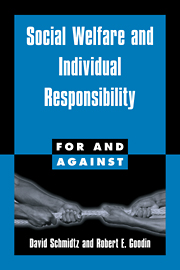Book contents
- Frontmatter
- Contents
- Series Editor's Introduction
- Preface
- 1 Taking Responsibility
- 2 Social Welfare as a Collective Social Responsibility
- 2.1 The Policy Context
- 2.2 Some Key Words in Context
- 2.3 Collective Responsibility
- 2.4 The Classic Case for Collectivization Restated
- 2.5 The Morality of Incentives and Deterrence
- 2.6 The Point of Politics
- References
- Index
2.2 - Some Key Words in Context
Published online by Cambridge University Press: 05 June 2012
- Frontmatter
- Contents
- Series Editor's Introduction
- Preface
- 1 Taking Responsibility
- 2 Social Welfare as a Collective Social Responsibility
- 2.1 The Policy Context
- 2.2 Some Key Words in Context
- 2.3 Collective Responsibility
- 2.4 The Classic Case for Collectivization Restated
- 2.5 The Morality of Incentives and Deterrence
- 2.6 The Point of Politics
- References
- Index
Summary
Several key words recur like mantras throughout contemporary social policy debates. A crucial first step in appraising those debates philosophically is to examine those terms in context. This is not a matter of standing back from the debates, analyzing concepts from the high plane of philosophical abstraction. Instead, it is a matter of examining “words in use” registering the ways those particular terms are deployed in those particular debates. The aim is not linguistic legislation, stipulating how these words “should” be used. The exercise is instead more akin to social ethnography, examining the way words actually are used for clues to the social theories and practices lying behind them.
The key words meriting particular attention in this regard are those of “dependency” and “reliance” (which are used more or less interchangeably in these debates) and of “the self.” (The notion of “responsibility” is discussed separately in section 2.3.) I offer a few remarks upon each of those terms in isolation, but it is their conjunction and interaction that matters most in these connections.
Dependency, Reliance, and Social Welfare
For a concise, general definition of the notions of “dependency” and “reliance,” the following will suffice:
X is “dependent” (or “relies”) on Y for Z insofar as:
(1) X receives Z from Y.
(2) X needs Z in order to protect some vital interests.
(3) Y is X's only source of supply of Z.
- Type
- Chapter
- Information
- Social Welfare and Individual Responsibility , pp. 116 - 144Publisher: Cambridge University PressPrint publication year: 1998



